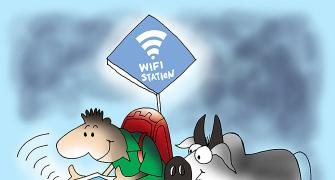Documents such as PAN card, Aadhaar card and I-T return papers, which are used for KYC, can get leaked from a number of sources, says Sanjay Kumar Singh, including the local xerox shop.

Recently, it was reported that a resident of Gujarat received a call from a bank enquiring whether he was the guarantor for an auto loan.
On visiting the bank he found that his PAN and two years’ income tax (I-T) returns papers had been fraudulently used to apply for a loan.
Further investigation revealed that six more such loan applications had been made at other banks.
With cases of identity theft on the rise across the country, you need to be vigilant to safeguard yourself against this new-age crime.
Documents such as PAN card, Aadhaar card, I-T return papers, etc, which are used for KYC, can get leaked from a number of sources.
A prominent source, say experts, is the direct sales agent (DSA).
Photocopy shops are another point. If you are not careful, extra copies of your documents could be made.
Also, if you don’t shred sensitive documents before throwing them in the waste paper bin, you are inviting trouble.
“When you submit your documents, write the purpose of submission overlapping the content, and not just at the bottom or in the margins. Along with your signature, put the date to minimise chances of misuse later,” says Hrushikesh Mehta, vice-president and head, direct to consumer interactive, TransUnion Cibil.
Be careful about whom you give your documents to. “Avoid handing out crucial document too freely to non-reputed entities,” adds Mehta.
I-T returns, too, are susceptible to leakage.
“Since returns have to be filed online, users who do not have personal computers use cyber cafés and end up sharing their user name and password with the computer operator.
"People also seek help from their chartered accountants with whom they share the user ID and password,” says Shree Parthasarathy, partner, Deloitte Touche Tohmatsu India LLP.
Each year, the government launches ITR filing melas; it also comes out with certified ITR filing individuals. Parthasarathy suggests you should use these services.
Individuals also need to check their credit reports regularly.
“If you own two credit cards and the report shows three, chances are that there has been a fraud,” says Parijat Garg, vice-president, CRIF High Mark.
Some companies have set up credit monitoring facilities for their customers.
“Every month the customers’ credit report is refreshed. Any change in his credit profile is notified.
"If a loan has been taken in their name, they can raise an alarm,” says Arun Ramamurthy, co-founder, Credit Sudhaar.
CRIF High Mark, too, plans to launch a monitoring service for retail clients soon.
“Anything happens -- for instance, the customer’s PAN card is submitted for a loan -- he will get an automatic alert,” Garg says.
Avoid sharing personal information on social media. “Sharing of personal data publicly is one of the key factors that leads to identity theft,” says Vaishali Kasture, managing director, Experian Credit Bureau India.
If your identity gets misused and you suffer a loss, file a first information report (FIR) with the police.
Next, send an information rectification request to the customer service division at the bank and the grievance officer.
If the bank doesn't respond, escalate the matter to the ombudsman.
The consumer court is another option for clearing your name.
Getting your credit report rectified is the final step. After the bank has accepted your contention (that you did not take the loan), inform the bureau.
“Any change to the credit report can be done only after concurrence from the bank.
This request must be accompanied with the relevant supporting documents, after which the bureau will work with the bank to make the necessary changes.
According to the Credit Information Companies (Regulation) Act 2005, the process of updating credit information should be done within 30 days of receiving the request,” Kasture says.
| Tools to defend yourself |
|
Photograph: Dado Ruvic/Reuters.










